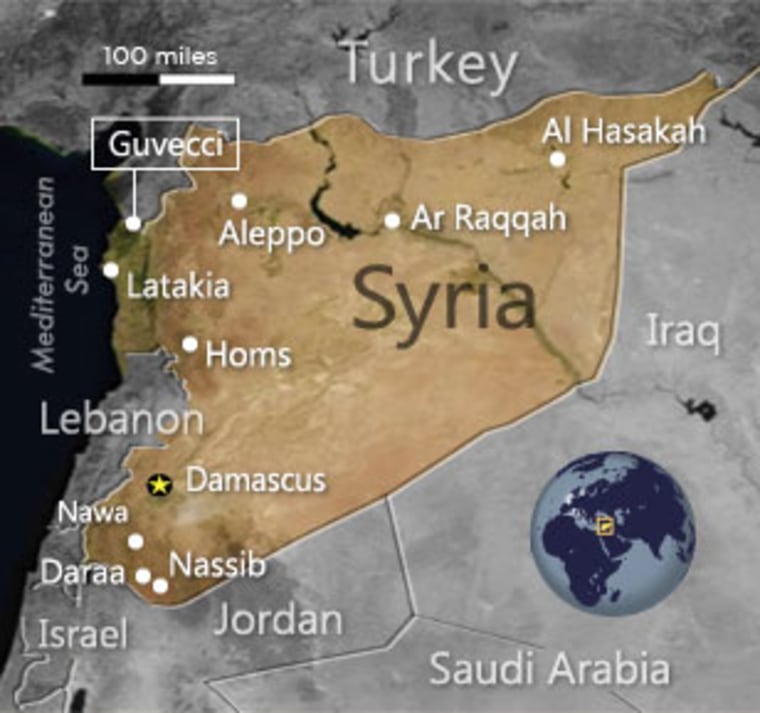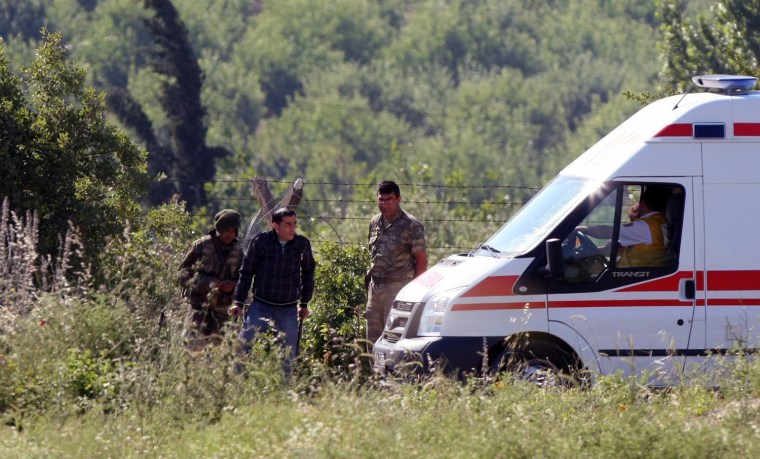Syrian troops and heavy armor encircled a restive northern town on Thursday and hundreds of people fled through a single escape route across the lush Turkish border, sharply escalating the upheaval that threatens Syria's authoritarian regime.
The town of Jisr al-Shughour emptied as its residents crossed olive groves and traveled gravel roads, trying to get away from the tanks and elite forces surrounding them, a resident and activist said. Turkey's foreign minister said more than 2,400 Syrians had crossed the border, which was opened for refugees.
As more Syrians took up temporary residence in tents and with Turkish relatives, the uprising that targeted President Bashar Assad drew increasing scrutiny abroad.
In Geneva, Navi Pillay, the U.N.'s High Commissioner for Human Rights, accused Syria of trying to "bludgeon its population into submission" by attacking anti-government protesters with snipers, tanks and artillery.
A man who stayed behind in Jisr al-Shughour said the town was all but empty and people in a nearby village had warned that hundreds of soldiers were massing along with 27 tanks and 50 armored personnel carriers.
"It seems they are ready to launch the attack," he said, asking that his name not be used for fear of reprisals.
"Jisr al-Shughour is practically empty. People were not going to sit and be slaughtered like lambs," said one refugee who had crossed Wednesday night and who gave his name as Mohammad.
"Demonstrations in the villages are still going on. Women and children are carrying flowers and shouting 'people want the downfall of the regime'," he said.

Turkish Prime Minister Recep Tayyip Erdogan has said his country will continue to accept all Syrians who flee, but he also has urged Syria's government to adopt reforms aimed at ending the unrest.
Syrian activists say more than 1,300 people have died in the crackdown on the 11-week uprising, most of them unarmed civilians; a government spokeswoman countered that 500 security forces had died in the uprising, including 120 who died in the Jisr al-Shughour area this week.
"The only instance where security forces have fired is when they have been fired at," Reem Haddad told Britain's Sky News. "How have these people been killed for goodness sake if no one is firing at them?"
Close ties with Turkey Turkey's Red Crescent set up one camp five weeks ago on the grounds of a disused tobacco factory on the outskirts of Yayladagi, a sleepy village of 6,300 where many speak Arabic as a first language and have families scattered both sides of the border which snakes its way through verdant green hills.
The Red Crescent is now building a second camp as hundreds continue to arrive, picked up by scores of minibuses hurtling through the winding roads to pick up refugees. The border itself is marked just with barbed wire and a military road running along the Turkish side.
Groups of Syrians were crossing into Turkey by the hour from the province of Idlib, on motorbikes, pickup trucks and on foot.
"I don't want to die. I want Bashar Assad to go," said one Syrian teenager, who identified himself only by his first name, Ahmad, fearing reprisals from the Syrian government. Activists say more than 10,000 people have been detained since the uprising began in mid-March.
Syrian tanks were also deployed in the streets of Aleppo, the province that is home to Syria's second-largest city of the same name, Turkish Prime Minister Recep Tayyip Erdogan told CNN-Turk television late Wednesday.
"There are tanks in the streets," Erdogan said. "They seem to have lost control there."
Aleppo has historic ties with Turkey and Erdogan said his government was taking measures to protect families there. Erdogan has said Turkey would accept all Syrians who flee, but he also has urged Syria's government to adopt reforms aimed at ending the unrest.
An influx of 1,000 refugees poured into Turkey through its villages of Altinozu and Guvecci on Wednesday night and Thursday morning, the official in Hatay province told The Associated Press. Authorities checked their identities before taking them to a refugee camp built accommodate 5,000 people in the nearby town of Yayladagi.
"Many of us have extended family in Syria, we have been very worried about them," said Mehmet Ergurdel, a 44-year-old butcher in Yayladagi.
"The refugees I've seen pass by seem to be in good health, but they must be very afraid. May God help them. Turkey is a big country and we can look after them. Personal ties between Syrians and Turks here are very close."
After World War I and the fall of the Ottoman Empire the province of Hatay, for centuries a melting pot of religions and ethnicities passed to French-mandated Syria control. Syria gained independence in 1936 but Hatay, which had a large Turkish population, became part of Turkey in 1939.
Turkey's ties with Syria were fraught in subsequent decades, in large part because of Syria's claim to Hatay, but have improved markedly in recent years under a policy by Prime Minister Tayyip Erdogan to reach out to Ankara's neighbors.
On a visit to the province last year Turkish President Abdullah Gul described it as a place where people of different faiths live in an atmosphere of affection.
Visa requirements between the neighbors were dropped in September 2009 and Turkish and Syrian ministers have held regular strategic cooperation meetings.
Easier access to both countries had let to a big increase in tourism before protests against Assad's government triggered a bloody crackdown.
